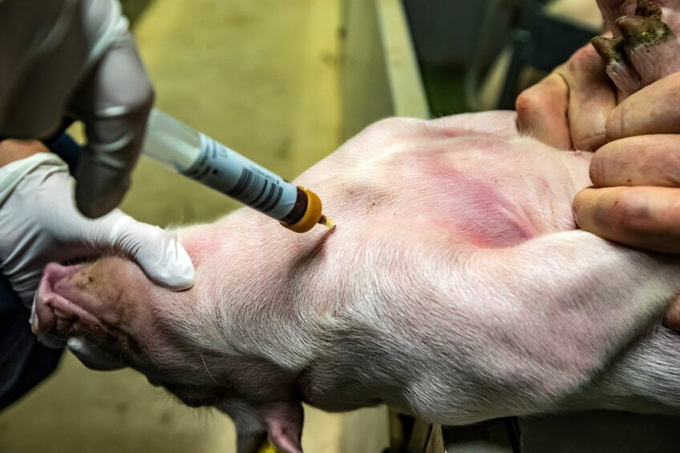June 19, 2025 | 18:38 GMT +7
June 19, 2025 | 18:38 GMT +7
Hotline: 0913.378.918
June 19, 2025 | 18:38 GMT +7
Hotline: 0913.378.918
The wait is now for an approval of the US Food & Drug Administration (FDA).

Photo: Ronald Hissink
The research project involves gene editing, a suitable application to use in cases where a single gene is involved; in this case, knocking out a single gene for the production of the surface protein. These gene edits result in pigs that lack a protein on their cell surfaces which enables entry of the PRRS virus.
ALSO READ: Interview Dr Lucina Galina (PIC): Searching for a solution to PRRS via genetics
Genus geneticists reported about the latest development in a new scientific paper, published in The CRISPR Journal, a peer-reviewed title dedicated to gene editing.
The team “produced healthy pigs that resisted PRRS virus infection as determined by macrophage and animal challenges. This founder population will be used for additional disease and trait testing, multiplication and commercial distribution upon regulatory approval.”
The team completed the gene edit by injecting pig zygotes (fertilised eggs) with Streptococcus pyogenes bacteria with the gene editing complex CRISPR-Cas9 and ribonucleoprotein (RNP).
This involved the synchronising of the oestrous cycles of donor and surrogate gilts. Donor animals were artificially inseminated twice. About 16 hours later, presumptive zygotes were harvested and injected with the RNP/Cas9, and donor sows were then inseminated.
In their paper the team noted that “generation of this founder population was not without challenges” (for example, only about 20% of pigs carried the intended commercial edit).
In relation to Genus activities, Prof Alison Van Eenennaam, cooperative extension in animal genomics and biotechnology at University of California, Davis, noted recently in a US media outlet that to move to commercial breeding of these pigs across the industry, the gene edit must be introduced into all of the parent lines that make up the four-way cross that’s common in many breeding programmes.
These are the Duroc, Landrace, Large White and the ‘synthetic’ grandparent stock. Furthermore, a homozygous gene edit (both DNA strands) is needed.
To do this, Genus has determined it needed to edit 10 to 20 ‘high genetic merit’ pigs in each of the 4 parent lines.
(PP)

(VAN) Poultry production in Poland, which has only started recovering from devastating bird flu outbreaks earlier this year, has been hit by a series of outbreaks of Newcastle disease, with the veterinary situation deteriorating rapidly.

(VAN) Extensive licensing requirements raise concerns about intellectual property theft.

(VAN) As of Friday, a salmonella outbreak linked to a California egg producer had sickened at least 79 people. Of the infected people, 21 hospitalizations were reported, U.S. health officials said.

(VAN) With the war ongoing, many Ukrainian farmers and rural farming families face limited access to their land due to mines and lack the financial resources to purchase needed agricultural inputs.

(VAN) Vikas Rambal has quietly built a $5 billion business empire in manufacturing, property and solar, and catapulted onto the Rich List.

(VAN) Available cropland now at less than five percent, according to latest geospatial assessment from FAO and UNOSAT.

(VAN) Alt Carbon has raised $12 million in a seed round as it plans to scale its carbon dioxide removal work in the South Asian nation.